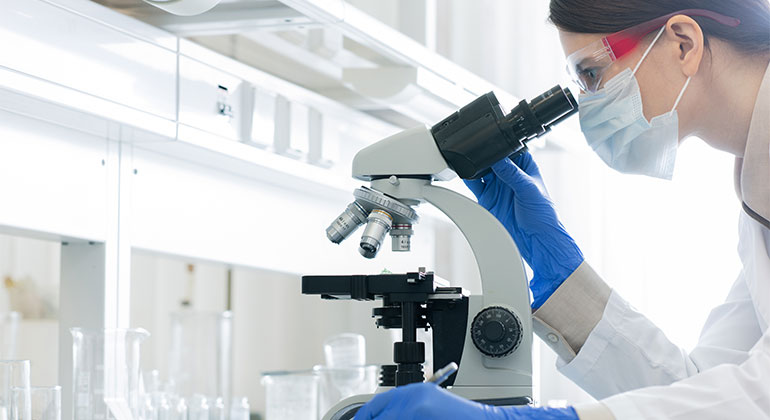Single Hair Strand Could Provide Biomarker for ALS, Mount Sinai Study Finds

Researchers at the Icahn School of Medicine at Mount Sinai have shown for the first time that a single strand of hair can reveal unique elemental patterns that distinguish people with amyotrophic lateral sclerosis (ALS) from healthy individuals. The findings, published in eBioMedicine, suggest that a simple, non-invasive hair-based test could one day speed ALS diagnosis and improve patient care.
ALS is a progressive and fatal neurodegenerative disease, typically taking 10 to 16 months from symptom onset to diagnosis in the United States. Earlier detection is critical since it improves the patient's quality of life and therefore potentially prolonging survival, but current fluid- and imaging-based biomarkers are often invasive, expensive, and difficult to integrate into routine clinical care. According to the ALS Association, the average survival time is three years, though about 20 percent of people with ALS live five years, 10 percent survive 10 years, and 5 percent live 20 years or longer.
Using advanced laser ablation-inductively coupled plasma-mass spectrometry, a technique that analyzes the elemental and isotopic composition of solid samples by using a laser to vaporize tiny particles, the research team analyzed single hair strands from 391 people (295 ALS-positive cases and 96 controls). Each hair strand provided up to 800 time points of data, representing elemental fluctuations at approximately two to four-hour intervals. The investigators measured 17 elements—including copper, zinc, magnesium, and lead—and used sophisticated information-theory tools to assess how elemental patterns shifted over time.
The study adds to evidence that copper plays a central role in ALS. Patients with ALS showed significantly lower synchrony (less coordinated, less similar, and less aligned in time) in copper-based elemental networks compared with controls, suggesting systemic dysregulation in copper metabolism. Male patients demonstrated weaker copper-zinc dynamics, while female patients showed disruptions in chromium-nickel patterns.
“Our study demonstrates that hair can serve as a window into the body’s elemental balance,” said Manish Arora, BDS, MPH, PhD, the Edith J. Baerwald Professor and Vice Chair of the Department of Environmental Medicine at the Icahn School of Medicine at Mount Sinai, and senior author of the study. “By analyzing the biodynamics of elements such as copper over time, we can detect disruptions associated with ALS in a simple, non-invasive way. This approach has the potential to transform how we diagnose ALS, making it faster, easier, and more accessible for patients.”
“This is the first-ever study to use hair strands to identify elemental dysregulation in ALS,” said Vishal Midya, PhD, Assistant Professor of Environmental Medicine at the Icahn School of Medicine and senior author of the study. “We found that patients with ALS had measurable differences in copper biodynamics that were not present in controls. These findings provide proof-of-concept that hair could serve as a simple and scalable diagnostic tool.”
While the study does not yet provide a diagnostic test, it shows that hair could be a promising new biomarker for ALS. A simple hair-based test might help shorten the time to diagnosis, allowing patients to start treatment and support sooner. Earlier care, including medications, nutrition plans, assistive devices, therapy, and counseling, can improve quality of life and may even extend survival.
This research was conducted in collaboration with Linus Biotechnology, Inc., Dartmouth University, and Columbia University, with support from the National Institutes of Health and the Centers for Disease Control and Prevention.
Read the full manuscript here: https://www.thelancet.com/journals/ebiom/article/PIIS2352-3964(25)00351-2/fulltext?rss=yes
About the Icahn School of Medicine at Mount Sinai
The Icahn School of Medicine at Mount Sinai is internationally renowned for its outstanding research, educational, and clinical care programs. It is the sole academic partner for the seven member hospitals* of the Mount Sinai Health System, one of the largest academic health systems in the United States, providing care to New York City’s large and diverse patient population.
The Icahn School of Medicine at Mount Sinai offers highly competitive MD, PhD, MD-PhD, and master’s degree programs, with enrollment of more than 1,200 students. It has the largest graduate medical education program in the country, with more than 2,600 clinical residents and fellows training throughout the Health System. Its Graduate School of Biomedical Sciences offers 13 degree-granting programs, conducts innovative basic and translational research, and trains more than 560 postdoctoral research fellows.
Ranked 11th nationwide in National Institutes of Health (NIH) funding, the Icahn School of Medicine at Mount Sinai is among the 99th percentile in research dollars per investigator according to the Association of American Medical Colleges. More than 4,500 scientists, educators, and clinicians work within and across dozens of academic departments and multidisciplinary institutes with an emphasis on translational research and therapeutics. Through Mount Sinai Innovation Partners (MSIP), the Health System facilitates the real-world application and commercialization of medical breakthroughs made at Mount Sinai.
-------------------------------------------------------
* Mount Sinai Health System member hospitals: The Mount Sinai Hospital; Mount Sinai Brooklyn; Mount Sinai Morningside; Mount Sinai Queens; Mount Sinai South Nassau; Mount Sinai West; and New York Eye and Ear Infirmary of Mount Sinai.
About the Mount Sinai Health System
Mount Sinai Health System is one of the largest academic medical systems in the New York metro area, with 48,000 employees working across seven hospitals, more than 400 outpatient practices, more than 600 research and clinical labs, a school of nursing, and a leading school of medicine and graduate education. Mount Sinai advances health for all people, everywhere, by taking on the most complex health care challenges of our time—discovering and applying new scientific learning and knowledge; developing safer, more effective treatments; educating the next generation of medical leaders and innovators; and supporting local communities by delivering high-quality care to all who need it.
Through the integration of its hospitals, labs, and schools, Mount Sinai offers comprehensive health care solutions from birth through geriatrics, leveraging innovative approaches such as artificial intelligence and informatics while keeping patients’ medical and emotional needs at the center of all treatment. The Health System includes approximately 9,000 primary and specialty care physicians and 10 free-standing joint-venture centers throughout the five boroughs of New York City, Westchester, Long Island, and Florida. Hospitals within the System are consistently ranked by Newsweek’s® “The World’s Best Smart Hospitals, Best in State Hospitals, World Best Hospitals and Best Specialty Hospitals” and by U.S. News & World Report's® “Best Hospitals” and “Best Children’s Hospitals.” The Mount Sinai Hospital is on the U.S. News & World Report® “Best Hospitals” Honor Roll for 2025-2026.
For more information, visit https://www.mountsinai.org or find Mount Sinai on Facebook, Instagram, LinkedIn, X, and YouTube.

“Forever Chemicals” Linked to Higher Risk of Type 2 Diabetes
Jul 22, 2025 View All Press Releases
